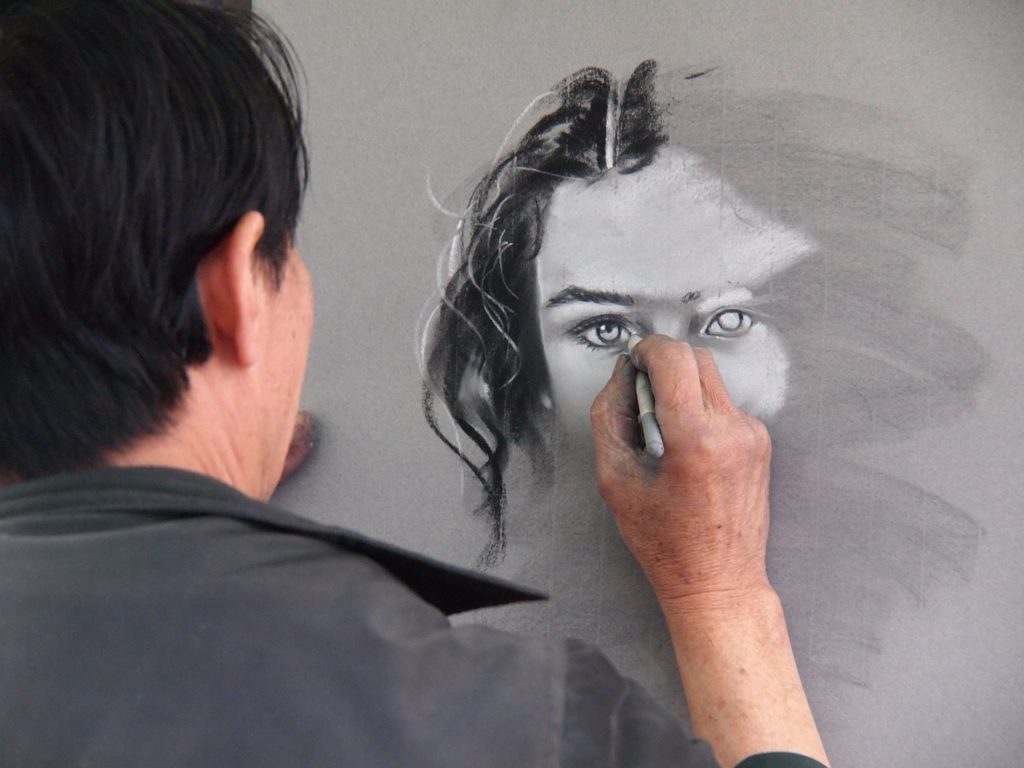- Calls to this hotline are currently being directed to Within Health, Fay or Eating Disorder Solutions
- Representatives are standing by 24/7 to help answer your questions
- All calls are confidential and HIPAA compliant
- There is no obligation or cost to call
- Eating Disorder Hope does not receive any commissions or fees dependent upon which provider you select
- Additional treatment providers are located on our directory or samhsa.gov
Art Therapy For Eating Disorder Recovery While In College

Contributor: Crystal Karges, MS, RDN, IBCLC, Director of Content and Social Media at Eating Disorder Hope/Addiction Hope
When it comes to art, many of us have different ideas of what defines this concept. We tend to think of it more as something to be observed or appreciated, but how can the creation of art serve purposefully?
For those who may be in recovery from an eating disorder, creating art can actually be a therapeutic and healing form of treatment.
In many ways, art therapy can be especially helpful for the college student in recovery. It provides a grounding way for processing the many different emotions that may be experienced during this transition time.
Learning More
What exactly is involved with art therapy, you may ask? According to the American Art Therapy Association, it can be described as form of mental health treatment that is facilitated by a specialized art therapist and effectively guides an individual through the creative process to accomplish many different things, including the exploration of feelings, to help ignite self-awareness, to better cope with mental health issues, to reconcile emotional difficulties, and more [1].
This type of therapy has been shown to be an effective form of treatment, particularly for individuals who have suffered with various forms of trauma and/or abuse, who have experienced illness, or who may have a mental health issue, such as an eating disorder. This therapy may include a range of medias, including painting, sculpting, drawing, and other art forms.
Art Therapy for a Recovering College Student
 College is often a time of incredible transition, and this can bring about many emotions, especially for a student in recovery from an eating disorder. Upholding appropriate and healthy coping mechanisms to effectively deal with transitions is important to preserve ongoing recovery efforts. Engaging in art therapy can also deliver many therapeutic benefits, improve interpersonal skills, and help reduce negative stress.
College is often a time of incredible transition, and this can bring about many emotions, especially for a student in recovery from an eating disorder. Upholding appropriate and healthy coping mechanisms to effectively deal with transitions is important to preserve ongoing recovery efforts. Engaging in art therapy can also deliver many therapeutic benefits, improve interpersonal skills, and help reduce negative stress.
If you are a college student in recovery and interested in learning more about how art therapy may be helpful for you, consider finding a qualified art therapist to connect with via the American Art Therapy Association.
You may be able to locate a specialized practitioner nearby your college campus. Alternatively, ask your treatment team about options for art therapy prior to transition to school. Explore the helpful option of art therapy as a way for supporting your recovery efforts.
Community Discussion – Share Your Thoughts Here!
How has art therapy been a helpful part of your recovery from an eating disorder?
 About the Author: Crystal is a Masters-level Registered Dietitian Nutritionist (RDN) with a specialty focus in eating disorders, maternal/child health and wellness, and intuitive eating. Combining clinical experience with a love of social media and writing, Crystal serves as the Special Projects Coordinator for Eating Disorder Hope/Addiction Hope, where her passion to help others find recovery and healing is integrated into each part of her work.
About the Author: Crystal is a Masters-level Registered Dietitian Nutritionist (RDN) with a specialty focus in eating disorders, maternal/child health and wellness, and intuitive eating. Combining clinical experience with a love of social media and writing, Crystal serves as the Special Projects Coordinator for Eating Disorder Hope/Addiction Hope, where her passion to help others find recovery and healing is integrated into each part of her work.
As a Certified Intuitive Eating Counselor, Crystal has dedicated her career to helping others establish a healthy relationship with food and body through her work with EDH/AH and nutrition private practice.
References:
[1]: American Art Therapy Association, “What is Art Therapy”, http://arttherapy.org/upload/whatisarttherapy.pdfThe opinions and views of our guest contributors are shared to provide a broad perspective of eating disorders. These are not necessarily the views of Eating Disorder Hope, but an effort to offer discussion of various issues by different concerned individuals.
We at Eating Disorder Hope understand that eating disorders result from a combination of environmental and genetic factors. If you or a loved one are suffering from an eating disorder, please know that there is hope for you, and seek immediate professional help.
Last Updated & Reviewed By: Jacquelyn Ekern, MS, LPC on August 21, 2016
Published on EatingDisorderHope.com

The EatingDisorderHope.com editorial team comprises experienced writers, editors, and medical reviewers specializing in eating disorders, treatment, and mental and behavioral health.

